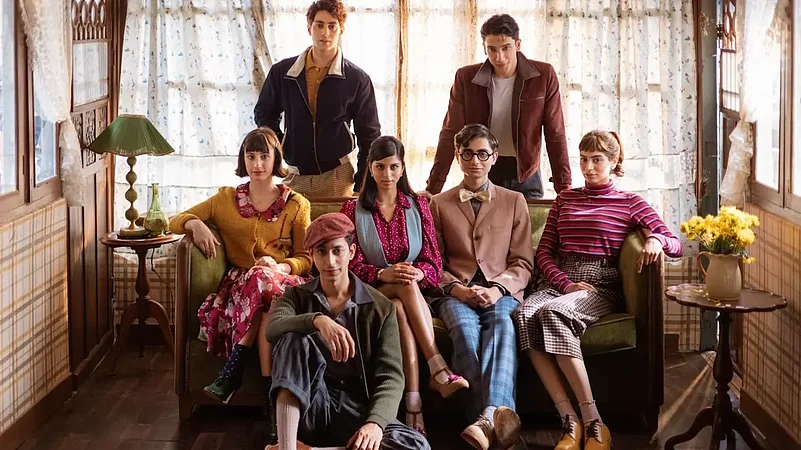With a 2-hour 23-minute runtime, Zoya Akhtar-directorial ‘The Archies’ has lavish set pieces. Think bronze gramophones, chic ice cream parlours, and cafés straight out of a glossy magazine. The fictional Green Park looks less like a rustic park one would associate with the Anglo-Indian community in the 1960s and more like a farmhouse in Vasant Kunj left by a rich baron as generational wealth for his South Delhi brat.
Jarringly Lavish, Painfully Unrealistic
In the fictional town of Riverdale, there are no houses but mansions, grass trimmed to perfection and strawberry milkshakes so fancy that if they’d make it to a Gianis ad, it would probably be termed false advertising. The grandeur and lavishness of the set pieces stand in stark contrast to the lacklustre acting performances which don't seem to do justice to the extravagant sets that are meant to compliment the actors’ presence rather than the other way around.
In ‘Archies’, the opulent aesthetic has an identity of its own. It is the only character that's doing its job in a star cast that is barely able to justify its presence on screen. Compare this to ‘Kohrra’, another show from Netflix India set in the hinterlands of Punjab in the eerie backdrop of deserted farmlands in the state. The murky visual imagery coupled with a dense fog which engulfs the cityscape, accentuates the murder mystery at hand, making the show far more compelling than it is.
Are Opulent Aesthetics The Problem?
Ashim Ahluwalia’s ‘Class’ is another Netflix India release which got flak this year for its aesthetic. Much like ‘Archies’, ‘Class’ has an over-the-top, unnecessarily lavish sets but it isn't as jarring because the plot is meant to show rich, spoilt brats who are thankless and painfully unaware of their privilege. Therefore, a school the size of Ambience Mall with interiors as posh as Harvard University isn’t particularly off-putting when you realize the intent is to contrast the privileged kids with the lesser-privileged ones, dwelling in nearby slums of East Delhi.
Zoya Akhtar and Reema Kagti’s ‘Made In Heaven’ season 2 is yet another release this year which had grand wedding sets and expensive costumes by some of the most reputed couturiers. The grotesque display of wealth in ‘Made In Heaven’ only underscores the satire on rich people that is the signature mark of the show. It isn’t meant to celebrate the rich but to highlight the grim irony at the end of each episode.
Vikramaditya Motwane’s ‘Jubilee’ on Amazon Prime Video also had opulent aesthetics which brought to life the magical world of Roy Talkies but its opulence was still rooted in reality where it showed a Jay Khanna making his way to the top from the post-Partition refugee camps. So clearly, opulent aesthetics work well as long as they serve a purpose.
Opulence For Opulence’s Sake
In the case of ‘Archies’, it seems like not just the sets but even the plot was written to accommodate an urban-looking cast, mainly rich Bandra boys and girls, rather than the other way around. An overreliance on posh aesthetics and forcefully integrating an Anglo-Indian community in 1960s India is the least of ‘Archies’ problems. The show seems to lack self-awareness on a molecular level.
The mismatch is not just in the way we hear Godrej and Lux ads in the same frame where foreign-sounding names like Riverdale, Jughead and Mr Lodger are used. The film in its entirety seems to have its basics confused, the same way the costume department of the 2000s film ‘Mohabbatein’ wasn't sure of the weather of the place it was set, with a few cast members wearing sweaters and others sporting sleeveless tops.
Misrepresentation Of Anglo-Indian Community
In an inherently visual medium like cinema, set design’s role is of paramount importance. It gives voice to the voiceless and draws attention to what is left unsaid. Strangely, in ‘Archies’, even the extras are white-skinned. The justification, of course, lies in the fact that the show is based on the Anglo-Indian community residing in North India in the 1960s.
The existence of the Anglo-Indian community post-independence is documented via the census. Lesser known fact: the members of the community even had reservations in the Parliament. Some members of the Anglo-Indian community include Goan Portuguese, and Malayali Tamils, while some of them live in East India. One can’t help but wonder why there are no dark-skinned Indians in Riverdale. Even for a fictional town full of Anglo-Indians, how is Riverdale isolated from mainland India?
Is ‘Archies’ a film based on the Anglo-Indian community or a film with actors who cannot speak fluent Hindi, being forced to masquerade as a film on the Anglo-Indian community to cover up the obvious flaws in the star cast?
More importantly — at what point does representation become misrepresentation and appropriation? That’s food for thought.
‘The Archies’ is now streaming on Netflix.





















